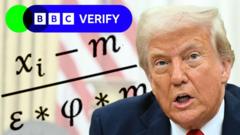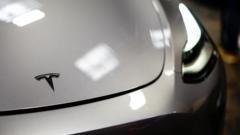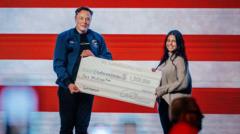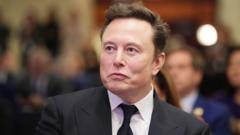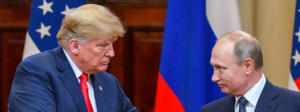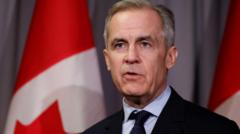In an unexpected turn of events, Mark Zuckerberg's dinner with Donald Trump hints at a thaw in their historically tense relationship, raising questions about the dynamics between tech leaders and politics.
Zuckerberg and Trump: A Surprising Dinner at Mar-a-Lago
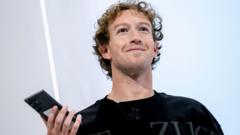
Zuckerberg and Trump: A Surprising Dinner at Mar-a-Lago
Meta CEO's visit signals possible reconciliation with former President
Mark Zuckerberg, the founder and CEO of Meta, has recently visited Donald Trump at his Mar-a-Lago estate in Florida, marking a notable shift in their previously strained relationship. This dinner comes amid rising tensions and a previously adversarial history, particularly after Trump's ban from Facebook and Instagram following the Capitol riots.
Despite a past characterized by public conflicts, primarily sparked by Trump's criticisms of Meta and Zuckerberg's response to political pressures, the recent gathering suggests an intriguing improvement in their interactions. As a spokesperson for Meta confirmed, Zuckerberg appreciated the dinner invitation, stating, "It’s an important time for the future of American innovation." This sentiment aligns with the growing sense of urgency within both the tech world and politics as the 2024 electoral landscape looms closer.
Historically, Trump's interactions with Zuckerberg have been contentious. In Trump's book published in August, he escalated tensions by indicating that Zuckerberg would face imprisonment if he attempted to interfere in the upcoming election. However, just months later, Trump softened his rhetoric, expressing gratitude towards Zuckerberg for remaining uninvolved in electoral affairs and thanking him personally after experiencing an assassination attempt.
More recently, Zuckerberg has displayed a willingness to bridge the gap between himself and Trump. The decision to restore Trump's access to Meta platforms signifies a potential recalibration of their relationship. Zuckerberg publicly expressed regret for previous actions, such as de-emphasizing content tied to Hunter Biden's allegations, showing a desire for neutrality in political discourse.
Nevertheless, it's important to contextualize this evolving relationship within the broader tech and political arena. While Zuckerberg's engagement with Trump may represent an effort towards cooperation, Trump's robust rapport with Elon Musk continues to dominate headlines, overshadowing Zuckerberg's initiatives. Musk has garnered significant influence, siphoning over $100 million in campaign donations, evidencing an interconnectedness between political ambition and tech mogul alliances.
In contrast, Zuckerberg and Musk share a history of rivalry, stemming from failed business ventures and personal disputes, making the dynamic further intriguing. Despite their differences and verbal sparring, the possibility of collaboration between Zuckerberg and Trump sheds light on the complex interplay of technology and politics in an increasingly polarized society. As Meta faces growing regulatory challenges, the implications of this dinner might extend beyond a simple meal, potentially shaping the future of both the tech company and its relationship with US politics.
Despite a past characterized by public conflicts, primarily sparked by Trump's criticisms of Meta and Zuckerberg's response to political pressures, the recent gathering suggests an intriguing improvement in their interactions. As a spokesperson for Meta confirmed, Zuckerberg appreciated the dinner invitation, stating, "It’s an important time for the future of American innovation." This sentiment aligns with the growing sense of urgency within both the tech world and politics as the 2024 electoral landscape looms closer.
Historically, Trump's interactions with Zuckerberg have been contentious. In Trump's book published in August, he escalated tensions by indicating that Zuckerberg would face imprisonment if he attempted to interfere in the upcoming election. However, just months later, Trump softened his rhetoric, expressing gratitude towards Zuckerberg for remaining uninvolved in electoral affairs and thanking him personally after experiencing an assassination attempt.
More recently, Zuckerberg has displayed a willingness to bridge the gap between himself and Trump. The decision to restore Trump's access to Meta platforms signifies a potential recalibration of their relationship. Zuckerberg publicly expressed regret for previous actions, such as de-emphasizing content tied to Hunter Biden's allegations, showing a desire for neutrality in political discourse.
Nevertheless, it's important to contextualize this evolving relationship within the broader tech and political arena. While Zuckerberg's engagement with Trump may represent an effort towards cooperation, Trump's robust rapport with Elon Musk continues to dominate headlines, overshadowing Zuckerberg's initiatives. Musk has garnered significant influence, siphoning over $100 million in campaign donations, evidencing an interconnectedness between political ambition and tech mogul alliances.
In contrast, Zuckerberg and Musk share a history of rivalry, stemming from failed business ventures and personal disputes, making the dynamic further intriguing. Despite their differences and verbal sparring, the possibility of collaboration between Zuckerberg and Trump sheds light on the complex interplay of technology and politics in an increasingly polarized society. As Meta faces growing regulatory challenges, the implications of this dinner might extend beyond a simple meal, potentially shaping the future of both the tech company and its relationship with US politics.


